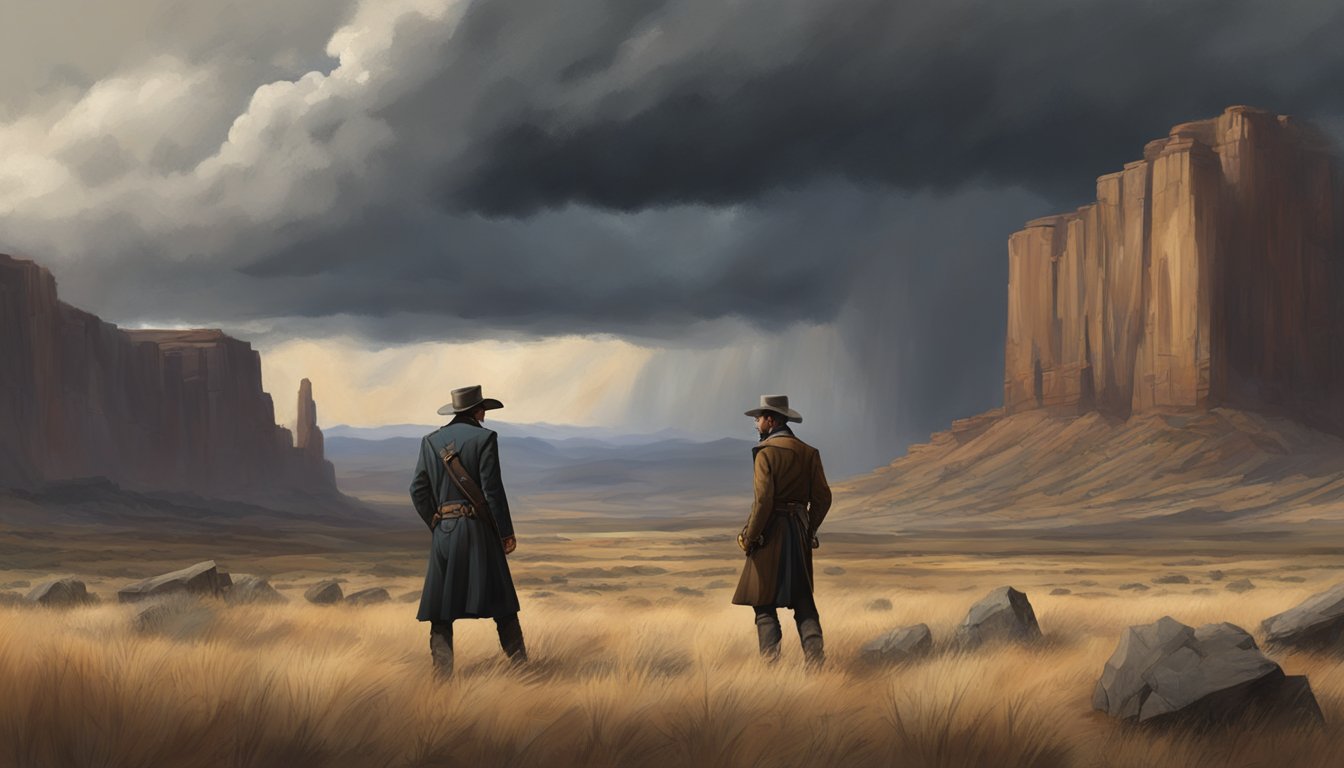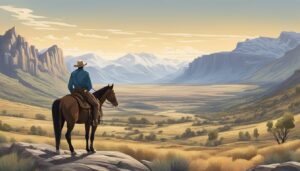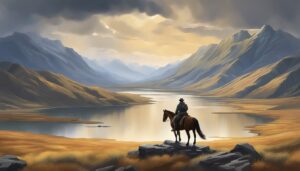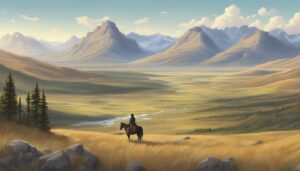Western heroes captivate audiences with their rugged personas and complex moral codes. Two iconic figures, John Dutton from “Yellowstone” and Django from “Django Unchained,” stand out as formidable protagonists in their respective stories.
John Dutton, portrayed by Kevin Costner, embodies the modern cowboy archetype. As the patriarch of the Yellowstone Dutton Ranch, he fiercely protects his family’s legacy and vast Montana property. His character blends traditional values with contemporary challenges, navigating complex power dynamics in a changing world.
Django, played by Jamie Foxx, presents a more unconventional Western hero, seeking vengeance and freedom in the antebellum South. His journey spans a larger geographical area, taking viewers across snowy landscapes and Southern plantations. Django’s quest for justice and personal liberation offers a unique perspective on the Western genre, challenging historical narratives and expectations.
Exploring the Western Genre
The Western genre has evolved significantly, blending traditional themes with modern storytelling. Contemporary Westerns like Yellowstone and Django Unchained have redefined the landscape, introducing complex characters and nuanced narratives.
Defining the Modern Western
Modern Westerns retain core elements of the classic genre while incorporating contemporary issues. These films and TV shows often explore themes of land ownership, family legacy, and moral ambiguity. They feature rugged landscapes and conflicts between tradition and progress.
Neo-Westerns set their stories in present-day settings. They maintain Western themes and aesthetics but address current social and political topics. This evolution has broadened the genre’s appeal to new audiences.
Characters in modern Westerns are more complex. They struggle with internal conflicts and moral dilemmas, moving beyond simple hero-villain dynamics.
Legacy of Western Dramas
Western dramas have left an indelible mark on popular culture. They shaped perceptions of American history and ideals of rugged individualism. Classic Westerns often romanticized the frontier experience.
Contemporary Western dramas build on this legacy while offering more critical perspectives. They examine historical injustices and question traditional narratives of conquest and progress. This approach adds depth to the genre’s storytelling.
These shows and films continue to explore timeless themes of justice, family, and survival. They adapt these concepts to resonate with modern viewers’ sensibilities and concerns.
Yellowstone’s Place in the Genre
Yellowstone has revitalized interest in Western dramas for television audiences. The show blends traditional Western elements with contemporary storytelling techniques. It focuses on the Dutton family‘s struggle to maintain their ranch in Montana.
John Dutton, played by Kevin Costner, embodies a modern take on the Western hero. He’s a complex character, balancing family loyalty with ruthless business tactics. This portrayal adds layers to the typical Western protagonist.
The series explores current issues like land development, Native American rights, and political corruption. These themes ground the show in present-day realities while maintaining a distinctly Western atmosphere.
Django Unchained’s Impact
Django Unchained brought a fresh perspective to the Western genre. Director Quentin Tarantino’s film addresses the brutality of slavery in the pre-Civil War South. It combines Western tropes with elements of blaxploitation cinema.
The movie’s protagonist, Django, subverts traditional Western hero archetypes. As a freed slave seeking vengeance, he offers a unique viewpoint rarely seen in the genre. This approach challenged audience expectations and sparked discussions about representation in Westerns.
Django Unchained’s critical and commercial success demonstrated the genre’s capacity for reinvention. It paved the way for more diverse narratives and characters in Western films. The movie’s impact extends beyond Westerns, influencing storytelling in various genres.
Central Characters Comparison
John Dutton and Django are complex protagonists who navigate morally ambiguous worlds. Their leadership styles, use of violence, and personal journeys shape their roles as Western heroes.
John Dutton’s Character Analysis
John Dutton, portrayed by Kevin Costner, is the patriarch of the Dutton family and owner of the largest ranch in the United States. He embodies the classic Western archetype of a strong, stubborn landowner fighting to protect his legacy.
Dutton’s character is defined by his unwavering dedication to preserving his family’s land and way of life. He often makes tough, morally questionable decisions in pursuit of this goal.
His complexity stems from the conflict between his role as a loving father and his ruthless business tactics. Dutton’s charisma and strong sense of duty make him a compelling, if flawed, protagonist.
Django’s Character Journey
Django, the titular character of Django Unchained, undergoes a transformative journey from enslaved man to skilled gunslinger. His quest for freedom and revenge drives the narrative.
Django’s character development is marked by his growing confidence and proficiency with firearms. As he hones his skills, he evolves from a man seeking personal vengeance to a hero fighting against the institution of slavery.
His unwavering love for his wife Broomhilda motivates his actions throughout the film. Django’s journey represents a subversion of traditional Western tropes, challenging racial stereotypes in the genre.
Leadership and Morality
John Dutton leads through a combination of intimidation, loyalty, and strategic thinking. He commands respect from his family and ranch hands, often using his influence to bend rules in his favor.
Dutton’s moral compass is guided by his desire to protect his land and legacy, sometimes at the expense of others. His leadership style is pragmatic and results-oriented.
Django, in contrast, emerges as a reluctant leader. His actions inspire others to fight against injustice. Django’s moral stance is clearer, as he fights against the evils of slavery.
Use of Violence and Revenge
Both characters employ violence as a means to an end, but their motivations differ. John Dutton uses violence strategically to protect his interests and maintain control over his land.
Dutton’s approach to revenge is calculated and often involves legal or financial retaliation rather than physical violence. He views violence as a necessary tool in a hostile world.
Django’s use of violence is more personal and directly tied to his quest for revenge against those who enslaved him and his wife. His violent actions are portrayed as justified within the context of his fight against oppression.
Portrayal of the American West
Yellowstone and Django Unchained offer contrasting depictions of the American West, showcasing different eras and aspects of frontier life. Both narratives explore themes of legacy, tradition, and the struggle for freedom and power.
The Dutton Family and Montana
Yellowstone paints a vivid picture of modern-day Montana through the lens of the Dutton family. The sprawling Yellowstone Ranch serves as a backdrop for exploring contemporary issues facing the American West. John Dutton embodies the traditional cowboy ethos while grappling with 21st-century challenges.
The show highlights the complexities of land ownership, resource management, and cultural clashes in Montana. It depicts the struggle to preserve ranching traditions against encroaching development and changing societal norms. The Duttons’ fierce attachment to their land reflects broader themes of legacy and the enduring spirit of the West.
Depiction of Slavery and Freedom
Django Unchained presents a stark portrayal of the pre-Civil War South, focusing on the brutality of slavery and one man’s quest for freedom. The film’s Western elements serve as a backdrop for exploring themes of justice and retribution.
Django’s journey from slave to bounty hunter offers a unique perspective on the American West. It challenges traditional Western narratives by centering on a Black hero. The film doesn’t shy away from depicting the harsh realities of slavery, using the Western genre to critique historical injustices.
Cinematic Elements

“Yellowstone” and “Django Unchained” showcase distinct visual styles and production elements that bring their Western stories to life. Each utilizes cinematography, locations, and sound to create immersive experiences.
Comparative Analysis of Cinematography
“Yellowstone” employs sweeping aerial shots of Montana’s rugged landscape, emphasizing the vastness of the Dutton ranch. The series often uses natural lighting to capture the harsh beauty of the American West.
“Django Unchained” features Tarantino’s signature stylized visuals. The film utilizes dramatic lighting, extreme close-ups, and dynamic camera movements to heighten tension and action sequences.
Both productions use wide-angle lenses to showcase expansive vistas, but “Yellowstone” leans more towards realism while “Django Unchained” embraces a heightened, almost theatrical visual approach.
Set and Filming Locations
“Yellowstone” is primarily filmed on location in Montana and Utah. The Chief Joseph Ranch in Darby, Montana serves as the iconic Dutton ranch house, providing authenticity to the show’s setting.
“Django Unchained” was shot across multiple locations, including California, Wyoming, and Louisiana. The film recreates various Southern plantations and Western frontier towns with meticulous attention to period detail.
Both productions leverage their locations to enhance the storytelling. “Yellowstone” uses real working ranches, while “Django Unchained” constructs elaborate sets to achieve its stylized vision of the antebellum South and Old West.
Musical Scores and Sound Design
“Yellowstone” features a haunting, guitar-driven score by Brian Tyler. The music blends contemporary and traditional Western elements, reflecting the show’s modern take on the genre.
“Django Unchained” boasts an eclectic soundtrack curated by Quentin Tarantino. It combines spaghetti Western-inspired original compositions with anachronistic pop and hip-hop tracks.
Sound design in “Yellowstone” emphasizes natural ambient noises, from wind rustling through grass to cattle lowing. “Django Unchained” uses exaggerated sound effects to punctuate its action sequences and heighten dramatic moments.
Both productions’ audio elements contribute significantly to their distinct atmospheres and storytelling styles.
Cultural and Social Impact

Yellowstone’s John Dutton and Django from Django Unchained have left distinct marks on popular culture. Their characters have sparked discussions about representation, authenticity, and storytelling in Western media.
Fan Engagement and Opinions
Yellowstone’s John Dutton has garnered a dedicated fanbase. Viewers debate his complex morality and leadership style on social media platforms. Many admire his unwavering commitment to preserving his family’s legacy.
Critics praise Kevin Costner’s nuanced portrayal, noting how it adds depth to the character. Some fans view John Dutton as a symbol of traditional American values.
Django, portrayed by Jamie Foxx, has also resonated with audiences. His quest for justice and freedom has sparked conversations about racial representation in Westerns.
Fans appreciate Django’s strength and determination. His character challenges stereotypes and offers a fresh perspective on the genre.
Influence on Modern Storytelling
John Dutton’s character has redefined the modern Western protagonist. His morally ambiguous nature has inspired other TV shows to create more complex lead characters.
Yellowstone’s success has led to a resurgence of Western-themed dramas. The show’s focus on family dynamics and land disputes has become a template for new series.
Django’s impact extends beyond the Western genre. His character has influenced the portrayal of Black heroes in mainstream cinema.
The film’s critical reception praised its bold storytelling approach. Django Unchained’s success paved the way for more diverse narratives in historical fiction.
Both characters have encouraged writers to explore unconventional themes within traditional Western settings.
Economic and Industry Influence

John Dutton and Django have shaped their respective industries in different ways. Their impacts extend beyond the screen to influence streaming platforms, market dynamics, and investment strategies.
Streaming and Distribution
John Dutton’s “Yellowstone” has become a cornerstone of Paramount Network’s lineup. The show’s success led to its availability on Peacock, expanding its reach. This distribution strategy highlights the evolving landscape of TV content delivery.
Paramount leveraged “Yellowstone” to boost subscriptions for its streaming service. The show’s popularity drove significant viewer engagement and attracted new subscribers.
Django’s impact on streaming is less direct but still notable. “Django Unchained” remains a sought-after title on various platforms, contributing to the demand for Western-themed content.
Market Presence and Investment
“Yellowstone” sparked renewed interest in modern Western dramas. This trend influenced production decisions across the industry. Studios increased investment in similar projects, hoping to replicate its success.
The show’s popularity affected real estate markets in Montana and surrounding areas. Property values near filming locations saw increases, mirroring the fictional conflicts with Market Equities in the series.
Django’s influence is more subtle but equally impactful. The film’s success encouraged studios to invest in unconventional Western narratives. This shift opened doors for diverse storytelling and representation in the genre.
Expansion and Longevity

The Western genre continues to evolve through spin-offs and sequels. Both Yellowstone and Django Unchained have explored ways to expand their stories and maintain audience interest over time.
Sequels and Spin-offs
Yellowstone has embraced an expansive approach to storytelling. The show’s success has spawned multiple prequels and spin-offs. “1883” delves into the Dutton family’s origins, while “1923” explores another generation of Duttons.
The upcoming “6666” spin-off will focus on the famous Texas ranch featured in Yellowstone’s fourth season. These expansions broaden the Yellowstone universe and provide deeper context to the main story.
Django Unchained, while a standalone film, has inspired discussions of potential sequels. However, no concrete plans have materialized for expanding Django’s story on screen.
Future Prospects and Endurance
Yellowstone’s fifth season has been split into two parts, with the second half eagerly anticipated by fans. The show’s popularity suggests it may continue for several more seasons.
The Yellowstone franchise’s multiple timelines and spin-offs create potential for long-term storytelling. “1923” has been renewed for a second season, indicating strong viewer interest in the extended Dutton saga.
Django’s future as a character remains uncertain. While the film achieved critical acclaim, its legacy primarily lies in its impact on the Western genre rather than ongoing story expansions.
Character and Plot Development
John Dutton and Django undergo significant transformations throughout their respective stories. These changes shape their characters and drive the narrative arcs of Yellowstone and Django Unchained.
Evolving Family Dynamics and Power Struggles
John Dutton’s character development is closely tied to his family relationships. As the patriarch of the Dutton clan, he faces constant challenges to his authority and land ownership. His children – Beth, Jamie, and Kayce – each play crucial roles in the family’s power dynamics.
Beth Dutton emerges as a fierce protector of her father’s interests. Her sharp business acumen and ruthless tactics make her a formidable ally and opponent.
Jamie Dutton’s complicated relationship with his adoptive father creates tension within the family. His political ambitions often clash with John’s desires for the ranch.
Kayce Dutton struggles to balance his loyalties between his father’s expectations and his own family commitments.
Character Arcs and Growth
John Dutton’s character evolves from a single-minded rancher to a more complex figure. He grapples with political pressures, environmental concerns, and the changing landscape of the American West.
Rip Wheeler’s unwavering loyalty to John Dutton showcases his own growth from a troubled youth to a trusted ranch foreman.
Thomas Rainwater provides a counterpoint to John Dutton, representing Native American interests in land disputes.
Django’s character arc follows a dramatic trajectory from enslaved man to skilled bounty hunter. His quest for vengeance and freedom drives the plot of Django Unchained.
Both John Dutton and Django face moral dilemmas that test their resolve and shape their decisions throughout their respective stories.
Themes of Land and Legacy
Land and legacy intertwine as central themes for both John Dutton and Django. Their quests revolve around claiming and protecting territory, though in vastly different contexts.
Ranching and the Fight for Land
John Dutton’s life centers on preserving his family’s sprawling Montana ranch. He faces constant threats from developers, government agencies, and neighboring tribes seeking to claim portions of his property. Dutton employs both legal and extralegal tactics to maintain control, viewing the land as an extension of his family’s identity.
Django’s fight for land takes a different form. As a freed slave, his journey involves reclaiming his own autonomy and that of his wife. He traverses the antebellum South, confronting the brutal realities of a system that denied Black people ownership of land and their own bodies.
Protecting the Legacy and Succession
For John Dutton, legacy is paramount. He grooms his children to continue managing the ranch, ensuring the Dutton name remains tied to the land for generations. This often leads to conflict within the family as they navigate the burdens of succession.
Django’s legacy is more personal. His mission to rescue his wife Broomhilda represents a reclamation of family bonds torn apart by slavery. By fighting for their freedom, Django seeks to establish a legacy of resistance and self-determination.
Environmental Conservation and Conflict
The Yellowstone ranch faces pressure from environmental groups and government agencies aiming to protect the surrounding ecosystem. John Dutton often finds himself at odds with conservationists, despite his own connection to the land.
While not explicitly focused on environmental issues, Django’s story touches on the exploitation of land and resources in the South. The plantation system he fights against represents an unsustainable and morally bankrupt approach to land use.



